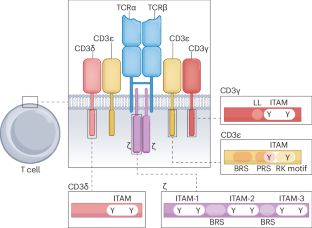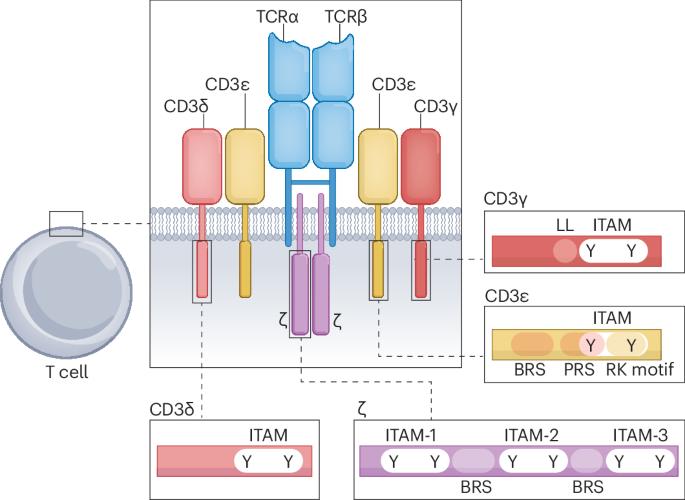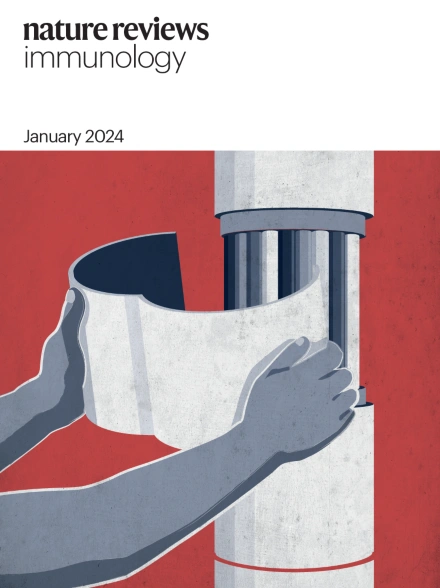From TCR fundamental research to innovative chimeric antigen receptor design
IF 67.7
1区 医学
Q1 IMMUNOLOGY
引用次数: 0
Abstract
Engineered T cells that express chimeric antigen receptors (CARs) have transformed the treatment of haematological cancers. CARs combine the tumour-antigen-binding function of antibodies with the signalling functions of the T cell receptor (TCR) ζ chain and co-stimulatory receptors. The resulting constructs aim to mimic the TCR-based and co-receptor-based activation of T cells. Although these have been successful for some types of cancer, new CAR formats are needed, to limit side effects and broaden their use to solid cancers. Insights into the mechanisms of TCR signalling, including the identification of signalling motifs that are not present in the TCR ζ chain and mechanistic insights in TCR activation, have enabled the development of CAR formats that outcompete the current CARs in preclinical mouse models and clinical trials. In this Perspective, we explore the mechanistic rationale behind new CAR designs. CAR T cells have transformed the treatment of some haematological cancers. This Perspective explores how insights into T cell receptor signalling have enabled the engineering of CAR formats that can outcompete currently approved CARs in preclinical models and clinical trials.



从 TCR 基础研究到创新型嵌合抗原受体设计
表达嵌合抗原受体(CAR)的工程T细胞改变了血液癌症的治疗方法。CARs结合了抗体的肿瘤抗原结合功能与T-=细胞受体(TCR)ζ链和共刺激受体的信号功能。由此产生的构建物旨在模拟基于 TCR 和共受体的 T 细胞活化。虽然这些疗法已成功治疗了某些类型的癌症,但仍需要新的 CAR 模式来限制副作用,并将其应用范围扩大到实体瘤。对 TCR 信号机制的深入研究,包括对 TCR ζ 链中不存在的信号基团的鉴定和对 TCR 激活机制的深入研究,使得 CAR 形式的开发成为可能,在临床前小鼠模型和临床试验中,这些 CAR 可与目前的 CAR 竞争。在本视角中,我们将探讨新型 CAR 设计背后的机制原理。
本文章由计算机程序翻译,如有差异,请以英文原文为准。
求助全文
约1分钟内获得全文
求助全文
来源期刊

Nature Reviews Immunology
医学-免疫学
CiteScore
93.40
自引率
0.40%
发文量
131
审稿时长
6-12 weeks
期刊介绍:
Nature Reviews Immunology is a journal that provides comprehensive coverage of all areas of immunology, including fundamental mechanisms and applied aspects. It has two international standard serial numbers (ISSN): 1474-1733 for print and 1474-1741 for online. In addition to review articles, the journal also features recent developments and new primary papers in the field, as well as reflections on influential people, papers, and events in the development of immunology. The subjects covered by Nature Reviews Immunology include allergy and asthma, autoimmunity, antigen processing and presentation, apoptosis and cell death, chemokines and chemokine receptors, cytokines and cytokine receptors, development and function of cells of the immune system, haematopoiesis, infection and immunity, immunotherapy, innate immunity, mucosal immunology and the microbiota, regulation of the immune response, signalling in the immune system, transplantation, tumour immunology and immunotherapy, and vaccine development.
 求助内容:
求助内容: 应助结果提醒方式:
应助结果提醒方式:


